The Asperges Rite in the Traditional Latin Mass
One of my favorite ceremonies in the Traditional Latin Mass (although it technically occurs before the Mass starts) is the Asperges, which is sung in all seasons except for Easter and Palm Sunday.
During this rite, the priest walks down the aisle and blesses the faithful with Holy Water.
The Holy Water reminds of our baptism and its cleansing effects.
However, the Aspergers prayers itself derive from Psalm 50.
“Thou shalt sprinkle me, O Lord, with hyssop, and I shall be cleansed; Thou shalt wash me, and I shall become whiter than snow. Have mercy on me, O God, according to Thy great mercy.”
Hyssop. an herb-like mint, was used in the old Testament for its cleansing, medicinal and flavor properties.
There are several mentions of hyssop in the old testament. For example, God told the Jews to ceremonially cleanse someone recently healed of leprosy.
“And the Lord spoke to Moses, saying:This is the rite of a leper, when he is to be cleansed: he shall be brought to the priest:
Who going out of the camp when he shall And that the leprosy is cleansed, shall command him that is to be purified, to offer for himself two living sparrows, which it is lawful to eat, and cedar wood, and scarlet, and hyssop.And he shall command one of the sparrows to be immolated in an earthen vessel over living waters:But the other that is alive he shall dip, with the cedar wood, and the scarlet and the hyssop, in the blood of the sparrow that is immolated:..” Exodus 14: 1-4. Douay-Rheims 1899 American Edition.
Also, in Exodus 12:22, God tells the Jews to paint their doors with lamb’s blood using hyssop, to protect them from the Angel of Death’s passing.
“And dip a bunch of hyssop in the blood that is at the door, and sprinkle the transom of the door therewith, and both the door cheeks: let none of you go out of the door of his house till morning.” Douay-Rheims 1899 American Edition.
Finally, during our Lord’s passion, the soldiers offered him a sponge soaked in vinegar perched on a hyssop stalk.
Afterwards, Jesus knowing that all things were now accomplished, that the scripture might be fulfilled, said: I thirst.
Now there was a vessel set there full of vinegar. And they, putting a sponge full of vinegar and hyssop, put it to his mouth. Jesus therefore, when he had taken the vinegar, said: It is consummated. And bowing his head, he gave up the ghost.” John 19:22-30. Douay-Rheim 1899 American Edition.
Symbolically, hyssop is used to cleanse and in the Latin Mass, the Asperges rite is meant to symbolically cleanse us before we assist the Holy Sacrifice of the Mass, but we still need to be in the state of grace to receive communion.
The Asperges Rite in the Traditional Latin Mass (Latin)
Aspérges me. Dómine, hyssópo, et mundábor: lavábis me, et super nivem dealbábor. Miserére mei, Deus, secúndum magnam misericórdiam tuam. P.Glória Patri, et Fílio, et Spirítui Sancto. S.Sicut erat in princípio, et nunc, et semper, et in sæcula sæculórum. Amen. Aspérges me. Dómine, hyssópo, et mundábor: lavábis me, et super nivem dealbábor.
At the foot of the altar the priest says:
Osténde nobis, Dómine, misericórdiam tuam. S.Et salutáre tuum da nobis. P.Dómine, exáudi oratiónem meam. S.Et clamor meus ad te véniat. P.Dóminus vobíscum. S.Et cum spíritu tuo. P.Orémus.
Exáudi nos, Dómine sancte, Pater omnípotens, ætérne Deus, et míttere dignéris sanctum Angelum tuum de cælis, qui custódiat, fóveat, prótegat, vísitet, atque deféndat omnes habitántes in hoc habitáculo. Per Christum Dóminum nostrum. S.Amen.
The Asperges Rite in the Traditional Latin Mass (English)
Thou shalt sprinkle me, O Lord, with hyssop, and I shall be cleansed; Thou shalt wash me, and I shall become whiter than snow. Have mercy on me, O God, according to Thy great mercy. P.Glory be to the Father, and to the Son, and to the Holy Ghost. S.As it was in the beginning, is now, and ever shall be, world without end. Amen. Thou shalt sprinkle me, O Lord, with hyssop, and I shall be cleansed; Thou shalt wash me, and I shall become whiter than snow.
Show us, O Lord, Thy mercy. S.And grant us Thy salvation. P.O Lord, hear my prayer. S.And let my cry come unto Thee. P.The Lord be with you. S.And with thy spirit.
P. Let us pray. Hear us, O holy Lord, almighty Father, everlasting God, and vouchsafe to send Thy holy Angel from heaven, to guard, cherish, protect, visit and defend all that are assembled in this place: Through Christ our Lord. S.Amen.
Text source: liturgies.net.
For more on the Latin Mass, see The Latin Mass Explained.



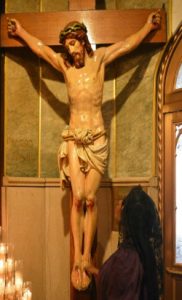
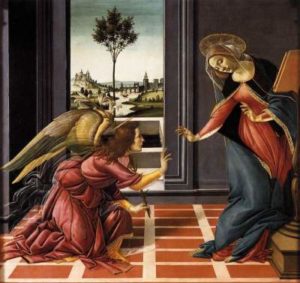
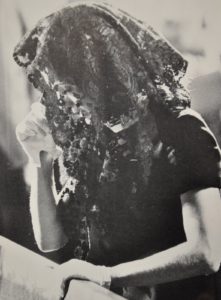
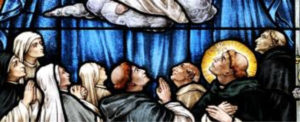
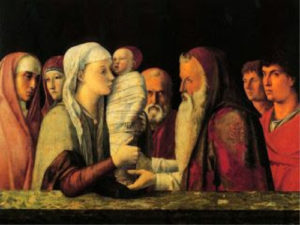
I am praying for the Traditional Holy RCC to return to her Truth. We are not a denomination but the Absolute Truth of Jesus Christ. I weep when I kneel make the sign of the cross and take communion by mouth because He is
Present . I can only receive from a priest
Hands that are consecrated. No Deacon, and never a lay person. With all these newly Appointed Progressive modernist Cardinal from the USA will we all have to go to SSPX ? Saint John Paul 2 please pray for. The Church is almost all gray now.
Have Faith.
Sorry to just be seeing this post! Thank goodness there are lots of churches offering the Latin Mass. God bless!
The Latin Church generally uses the Hebrew numbering system for Psalms, not that of the Greek. You called it Psalm 50, but most Latins would call it 51.
Thanks for your interesting comment. It’s interesting because different sources seem to list it as Psalm 50, while others list it as Psalm 51.
I use the Douay Rheims version and when I search online, I see it sometimes listed as Psalm 50 and sometimes as Psalm 51.
Bible Hub lists the source of the text as Psalm 51.
This page which contains an online version of the Douay Rheims lists it as Psalm 50.
Bible Gateway lists it as Psalm 50.
So I’m not sure what’s going on and I don’t have a physical copy of the Douay Rheims handy.
It is Psalm 50 in the Douay-Rheims Version. The reason the Psalms differ early on is shown in Psalm 9. Psalm 9 is a rather long psalm. In the D-R [2009 reprint, Saint Benedict Press, Charlotte, NC], the note to Ps. 9:21explains “Here the late Hebrew doctors divide this psalm into two, making verse 22 the beginning of Psalm 10. And again they join Psalms 146 and 147 into one, in order that the whole number of psalms should not exceed 150. And in this manner the psalms are numbered in the Protestant Bible.”
The Confraternity of Christian Doctrine, Douay version, labels the two parts as 9(A) and 9(B), and proceeds with the balance as 10 (11), etc.
The Vulgate Bible of St. Jerome treats the two halves as one, i.e., Psalm 9.
https://vulgate.org/ot/psalms_9.htm
Confusion was meant. God knows our heart. I remember I made my communion during the Traditional. Then I went to church and it was changed. No longer communion at the kneelers in front of the altar. In your hand instead of your tongue. The beautiful smell of incense was gone. Our parents back in the day didn’t know what hit them. It was never the same. God save us from these evil doers. I thought we had freedom of religion. I choose the Traditional Mass. It’s a different religion altogether.